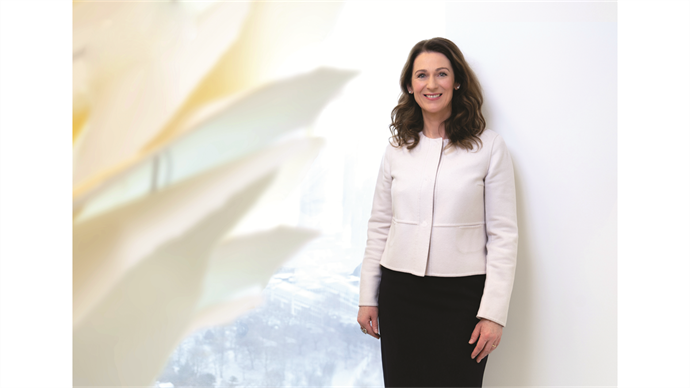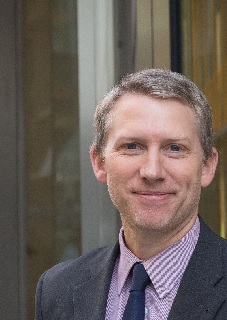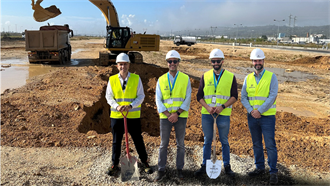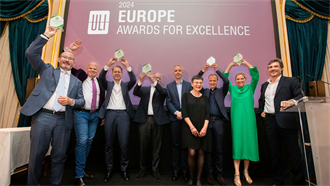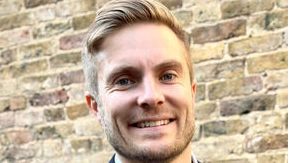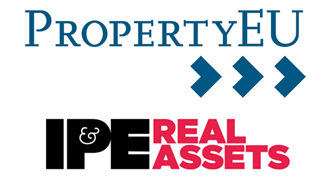After forging a truly pan-European organisation, Barbara Knoflach’s next priority at BNP Paribas REIM is to define a new investment approach while maintaining a 10% growth path.
Barbara Knoflach is three-and-a-half years into her tenure at French group BNP Paribas Real Estate. The last time we caught up with the deputy chief executive officer responsible for investment management was back in 2016 when she said one of the stated aims was to grow AUM to €30 bn.
Currently, the firm is very close, standing at €28.7 bn (+€1.5 bn of listed real estate). She also said the company wanted to expand the firm’s pan-European products and grow a separate accounts business. Today, the firm does indeed manage pan-European products such as a Europe office fund and a logistics vehicle. Last year, the company also raised €2.2 bn for its separate accounts division from eight individual mandates.
When Knoflach joined, BNP Paribas REIM consisted of four Alternative Investment Fund Manager (AIFM) companies in France, Germany, Italy, and Luxembourg with additional entities in London, Brussels, Madrid, plus other locations. They have now been put under one European functional roof and turned into full-service providers.
BNP Paribas Real Estate runs not only investment management that Knoflach heads up, but other property services such as research, development, consulting and valuation, and property management.
Says Knoflach: ‘The overall network was already there. But when I joined in August 2015 there was the clear desire to make the organisation European, and my concern of course is the investment management business. At the time I joined, it was a collection of several very nicely run individual country organisations and companies, but the aim was to combine them into a harmonised global player. I was lucky because the whole organisation was really longing to become European.’
European approach
Knoflach highlights how Europe is a fragmented market because of the different nations, legal systems and tax regimes, not to mention the different sectors on top of the different countries. So, what she sees as BNP Paribas’ USP is expertise in local markets but at the same time capability to offer ‘the whole span of Europe’.
‘Today, we are one of the excellent networks in real estate. I think we are a unique player, because we offer the full value creation chain in real estate within our company. So, from the developer to the property manager, you have got every piece and there are not so many other players who can really offer that. And with the very clear focus on Europe, that's another speciality. So, I think we can really say we are European specialists.’
But, as she says, it is one thing to want to become European and something totally different to be European. With Knoflach at the helm of investment management, the company wanted to keep the ‘local strength’ and ‘excellent people’ but somehow combine it all for a ‘real European approach’. The idea was arrowed at offering the same level of quality and similar levels of services to its international clients.
But one gets the impression it has not been a cake walk. The challenge lies in the fact that it employs more than 350 professionals with different nationalistic traits.
‘You know, I'm dealing with quite a lot of nationalities, and they all have their “speciality”, let’s call it that. But for a really global manager, that's the salt in the soup. So, what I really like is to see how to make it work in a team where you have a mix of French, Italians, Germans and a lot of other nationalities; To take a multicultural company and try to knit it together in an inter-disciplinary way and then to find a common way forward. That is about creating real strength and that is what Europe is all about.’
Asked if she noticed traits among the nationalities that affected her approach to making changes, Knoflach smiles. She says that for the French she is a ‘little too insistent on change a little too fast’, while for the Germans she is ‘far too slow and not insistent enough’. For Italians, she is ‘too blunt’ perhaps. And for the English? ‘With the English, you know, there is a way of saying things, of saying things the right way!’
Adapting to change
Knoflach herself seems comfortable with change. She talks about the need to ‘adapt to change’ and having a ‘spirit of adaptation’ in a world that is changing daily. ‘And if you can create a sense of spirit that you're changing and finding your place, then in the end it makes the whole organisation and its people safer,’ she states.
During the passage of an hour in the company of Knoflach, one discovers she has some trademark words that you don’t hear other real estate CEOs say as frequently. Perhaps it is just a linguistic thing, but, for example, she uses the word ‘nice’ 27 times within 40 minutes. The growth in separate accounts has been ‘really, really nice’, and the company has been on a ‘nice run’ for its logistics fund, and a ‘very nice run’ on its open-ended fund. A new pan-European office fund has a ‘nice sustainable angle on it’, and there is a new bigger and more harmonised strategy with a ‘nice value add’ idea in the works.
The word might be overused, but it is endearing, sweet and gentle – and yes, she comes across as ‘nice’ herself. But behind that aspect one gets the impression there is an unusual amount of patience, determination and steel that has been necessary to achieve corporate change required.
So how has she approached the task from a management perspective? ‘My personal belief is there is no one right management style in such a multicultural environment. It will never be perfect. It is a fine balance between being patient and explaining and onboarding people. On the other hand, you have to make tough decisions sometimes. You have your good moments and your real successes to be able to onboard people. But you also have the other side of the coin, when you sometimes think “not again, there is a gap”, but it is about repetition. You need a long-term view that change is never going to work just like that. Never, ever. So, you need to have a very clear vision and you have to have the courage and the patience to continually go in the same direction.’
So, where does this business leader get this patience and perseverance from? Were there any clues from her childhood that suggested she would be good at running a financial multi-cultural organisation through change?
Farmer’s daughter
Knoflach says her childhood was spent growing up on farm in the Austrian Alps where there was responsibility and an expectation upon the children to accomplish daily tasks. She had to take her turn among her brothers milking cows and such like. ‘I learned very early that, you know, when cows need to be milked, they need to be milked. It doesn't matter if it's a Saturday or Sunday, or if you have a party to be at, you just have to get it done. Or when you are growing crops, it is the same thing. You know, you just have to do the right thing at the right moment. And I think that was a very good training at the very beginning.’
As in most other countries, in conservative Austria it was her brothers that were expected to take over the running of the farm, not her. So, what was she to do? The farmer’s daughter realised she had a talent for mathematics. Normally a female talented in maths in Austria would be pushed towards teaching, but this was not for Knoflach. Instead, she ended up studying computers and administration. Such studies were not possible for her at the time in Austria, and so she went to Germany to become one of the few females among hundreds of students.
She immediately received a job offer and was therefore able to launch a career in financial services, starting with a stint within Deutsche Bank, which she joined in 1986. She truly made her name in European real estate running SEB’s asset management business in Germany. When that was sold in 2015, she joined BNP Paribas Real Estate already having built up a high profile.
Automated processes
Today, she says BNP Paribas REIM is in the final stages of implementing harmonised processes throughout the whole organisation. It is putting into place an IT system to support it. ‘I'm very happy that we are moving now in that direction, with the changes in our industry and also the changes that our investors are faced with. There will be ongoing adaptation necessary and we definitely want to do much more in a more automated way to really fulfil CSR and ESG promises. That’s because it is always nice to implement promises into the DNA of an organisation. It gives you something really different. So that is definitely the next thing we are intensive looking into.’
She continues: ‘We also want to make use of our huge database. What I'm really thinking of is how we can use all the different data we have in our organisation to create forward-looking strategies? Having big data is one thing, but for me it's more about how to make use of that data. So how to really create winning strategies for clients.’
This is one of common challenges that the large European platforms face; There are so many opportunities that make sense for investment managers, but they can only take on a limited number.
She says frankly, ‘sometimes it really seems hard to really focus on what's most important.’
New investment approach
Knoflach says that the ‘intellectual priority number one’ at the firm is the formation of an innovative approach to investing. No formal name has been given to it yet, and she wants it kept simple. For now, she refers to it as Style Investing while others call it Factor Investing, both borrowed from the equity markets.
Usually, BNP Paribas REIM’s investment strategies derive from country or sector convictions or risk appetite. But Knoflach wants something more sophisticated than that. Senior management, product development, asset mangers, investment managers, researchers and fund managers are working on the initiative, she says. ‘Coming up with a different way to approach the market and fine-tuning that is something which we're working heavily on. And I hope that at some point this year, we're ready to kind of come up with an innovation here - a new way to define investment strategy.’
It is all geared towards a magic number of 10. Ever since Knoflach arrived, the target has been to achieve 10% growth, whether that be in AUM, deal volume, or profitability. ‘I hope to sit here in a year’s time and say we have made another 10% because we are all about a 10% growth path.’
Editor’s commentary
BNP Paribas REIM has several new initiatives that will make headlines. This month the company is converting its third closed-ended Europe office fund, Next Estate Income Fund III (NEIF III), into an open-ended product. It has around €400 mln of equity commitments so far and has allocated €450 mln GAV (gross asset value). The most recent investment was for Franklin Haus in Berlin, an 11,000 m2 building to be completed by the end of 2020.
The driving force behind converting this third fund into an evergreen structure is clients. In common with other investment managers, BNP Paribas REIM has investors that want to hold assets for the long term and do not wish to be in funds that have a fixed life span requiring sales towards the end of the period, which can come at an inopportune time or leave them with the headache of how to recycle distributions.
In addition, this year BNP Paribas REIM has its sights fixed on a wider European value-add strategy. Currently REIM manages upon some €4 bn of AuMs mainly executed in Italy and France. In future, REIM plans to offer clients value-add strategies across the Continent in a more standardised way.
BNP Paribas REIM is also getting excited about potential new Asian sources of capital. Its home turf of Europe provides most of its institutional investors, but it is starting to actively fundraise in Asia where it already serves many Korean clients. Knoflach has toured Japan several times and believes capital will funnel from large Japanese funds into BNP Paribas REIM.
Last year the firm managed to raise a very respectable €3.8 bn of client capital. That is actually a record amount for the company, which typically sees roughly a quarter of capital coming from France where it runs a series of award-winning retail funds. Of that €3.8 bn of equity raised, some €2.2 bn came from separate accounts, a business now gaining strong traction. For separate account clients, BNP Paribas REIM runs asset-driven strategies or mandate-driven ones. It is running country strategies for clients as well as sector strategies.
On the deal front, the firm can look back on a 12-month period during which it transacted €4.5 bn, of which €3.1 bn were acquisitions and €1.4 bn disposals. According to PropertyEU’s proprietary data as published in Top100Investors last December, €3.1 bn of acquisitions is exactly the annual average run rate for the largest 50 investors in European real estate. BNP Paribas is investing more or less all over Europe and in all sectors, the main ones being offices and logistics. In particular, it saw strong demand last year for Germany, France and Italy. But the big news is that BNP Paribas is gearing up for a cautious counter-cyclical investment drive into the UK. Though Brexit talks remain in disarray, BNP Paribas REIM has beefed up its UK team and is recruiting further in order to be ready to cautiously and selectively invest again.
Personal profile Barbara Knoflach
Barbara Knoflach has seen at least three major property cycles during her lengthy career. She began working in financial services at Deutsche Bank from 1986 where she cut her teeth at the bank’s international project financing unit based in Frankfurt. Her first taste of real estate came in 1991 when she transferred to the consulting and research department at Deutsche’s real estate subsidiary.
In 1999, her career moved on again when she joined Swedish group SEB as managing director of SEB Investment Management in Germany. She eventually took up the reins as CEO of SEB Asset Management from 2005 until 2015. In 2015, SEB sold its Asset Management group in Germany to Savills plc. It had €10 bn of real estate assets. Knoflach joined BNP Paribas Real Estate that same year.
Fact box BNP Paribas REIM
AUM: €28.7bn
Staff: 350+
Transactions in 2018: €4.5 bn (€3.1 bn of acquisitions)
Fund structures: Closed ended and open ended
AUM managed for institutional funds: €8 bn
AUM managed for separate accounts and club deals: €13 bn (45%)
AUM managed for private investors: €7.8 bn
Most popular strategies: Core and core plus
Asset classes for institutional investors: offices, retail, logistics and industrial, hotels, residential and alternatives such as senior housing, student housing and healthcare
Value add strategies: €4 bn of AUM
Debt funds: only for Germany-domiciled institutions

